Research
Peatland Carbon Loss and Restoration
Eroding blanket bog peatlands are losing large amounts of carbon, both directly as greenhouse gas emissions and as eroded sediment that is later lost to CO2 downstream. I am leading a research programme on the loss of particulate organic carbon (POC) from peatlands and the factors that determine its decomposition. I am also leading research on the impact of peatland restoration on peatland carbon losses
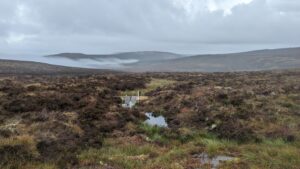
Planting and natural regeration of trees on organic rich soils
Tree planting and ‘rewilding’ of the Scottish uplands is high on the environmental agenda, my interest is is how these practices impact belowground processes and thw wider carbon cycle. I use a combination of DNA-based and process-based approaches to understanding soil ecology.
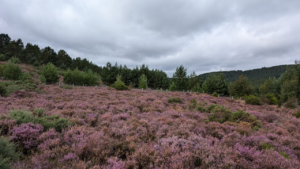
Plant-soil interactions in a greening Arctic
As the arctic climate warms, tall shrubs are expanding north into the tundra. My research has focussed on understanding how these changes in tundra plant community will impact carbon cycling in the soil. Acrtic soils represent one of the largest global stores of carbon and a major question I aim to answer is how the increasing plant activity in the tundra will affect this soil carbon store. I am a Co-investigator in a NERC-funded project with the Universities of Stirling of Edinburgh with Project Partners at the Swedish Agricultural University on the role of different fungi in the decomposition of soil carbon in the Arctic.
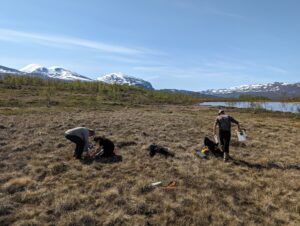
Postdoctoral Research Associate
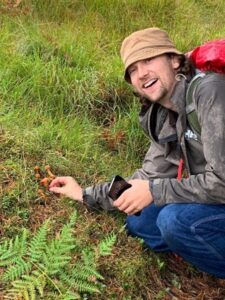
Louis Mielke – NERC 3.5 Year project- Turbo-charging the mycorrhizosphere – could more productive ecosystems threaten soil carbon stocks in boreal and sub-arctic zones of transition? [‘MYCONET’] Co-I with Philip Wookey (University of Stirling), Lorna Street (University of Edinburgh) and Andy Taylor (Hutton)
PhD Students (Current)
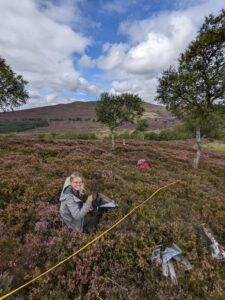
Naomi Housego – The impacts of colonisation by trees on moorland soil carbon stocks. Co-supervised with Ruth Mitchell (Hutton), Lorna Street (University of Edinburgh) and Elena Vanguelova (Forest Research)
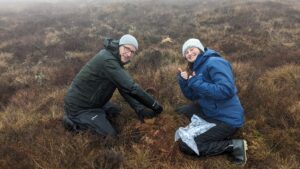
Ruth Helmore – The Resilience of Sphagnum and ecosystem function to drought events in peatlands. Lead supervisor with Jens-Arne Subke (University of Stirling), Rebekka Artz (Hutton) and Renée Kerkvliet-Hermans (IUCN Peatland Progamme)
PhD Students (Past)
Will Pallier – Linking microbial physiology to carbon cycling in peatlands of varying land use history. Co-supervised with Ashish Malik (formally University of Aberdeen), Rebekka Artz (Hutton) and Roxanne Anderson (University of the Highlands and Islands)
Past research
Ecophysiology of peatland plant species
My previous work in the tundra of Alaska focused on the ecology and adaptation of arctic plants, in particular Eriophorum vaginatum (tussock cottongrass). The climate in the Arctic is warming faster that anywhere else on earth and his research indicates that arctic plants may struggle to keep up with this change.
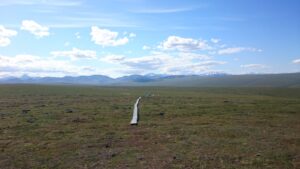
Publications
Journals
- Housego, N.C.; Parker, T.C.; Street, L.E.; Vanguelova, E.I.; Mitchell, R.J. (2025) Natural tree colonisation of organo-mineral soils does not provide a net carbon capture benefit at decadal timescales, Journal of Applied Ecology, 62(3), 617-626
- Phoenix, G.K.; Bjerke, J.W.; Björk, R.G.; Blok, D.; Bryn, A.; Callaghan, T.V.; Christiansen, C.T.; Cunliffe, A.M.; Davidson, S.J.; Epstein, H.E.; Loranty, M.M.; Martin, A.C.; Myers-Smith, I.H.; Olofsson, J.; Parker, T.C.; Parmentier, F.-J.W.; Stordal, F.; Treharne, R.; Tømmervik, H.; Voigt, C. (2025) Browning events in Arctic ecosystems: Diverse causes with common consequences, PLOS Climate, 4(1), e0000570
- Jonsson, M.; Clemmensen, K.E.; Castaño, C.; Parker, T.C. (2025) Trees First Inhibit Then Promote Litter Decomposition in the Subarctic, Ecology Letters, 28(1), e70063
- Macfarlane, F.; Robb, C.; Coull, M.; McKeen, M.; Wardell-Johnson, D.; Miller, D.; Parker, T.C.; Artz, R.E.; Matthews, K.; Aitkenhead, M.J. (2024) A deep learning approach for high-resolution mapping of Scottish peatland degradation, European Journal of Soil Science,75(4), e13538.
- Maes, S.L.; Dietrich, J.; Midolo, G.; Schwieger, S.; Kummu, M.; Vandvik, V.; Aerts, R.; Althuizen, I.H.J.; Biasi, C.; Björk, R.G.; Böhner, H.; Carbognani, M.; Chiari, G.; Christiansen, C.T.; Clemmensen, K.E.; Cooper, E.J.; Cornelissen, J.H.C.; Elberling, B.; Faubert, P.; Fetcher, N.; Forte, T.G.W.; Guadard, J.; Gavazov, K.; Guan, Z.; Guðmundsson, J.; Gya, R.; Hallin, S.; Hansen, B.B.; Haugum, S.V.; He, J.-S.; Hicks Pries, C.; Hovenden, M.J.; Jalava, M.; Jónsdóttir, I.S.; Juhanson, J.; Jung, J.Y.; Kaarlejärvi, E.; Kwon, M.J.; Lamprecht, R.E.; Le Moullec, M.; Lee, H.; Marushchak, M.E.; Michelsen, A.; Munir, T.M.; Myrsky, E.M.; Nielsen, C.S.; Nyberg, M.; Olofsson, J.; Óskarsson, H.; Parker, T.C.; Pedersen, E.P.; Petit Bon, M.; Petraglia, A.; Raundrup, K.; Ravn, N.M.R.; Rinnan, R.; Rodenhizer, H.; Ryde, I.; Schmidt, N.M.; Schuur, E.A.G.; Sjögersten, S.; Stark, S.; Strack, M.; Tang, J.; Tolvanen, A.; Töpper, J.P.; Väisänen, M.K.; van Logtestijn, R.S.P.; Voigt, C.; Walz, J.; Weedon, J.T.; Yang, Y.; Ylänne, H.; Björkman, M.P.; Sarneel, J.M.; Dorrepaal, E. (2024) Environmental drivers of increased ecosystem respiration in a warming tundra, Nature, 629, 105-113
- Parker, T.; Clemmensen, K. (2023) Understanding the role of fungi in peatland degradation after drainage, New Phytologist, 240(1), 10-12
- Friggens, N.L.; Hartley, I.P.; Parker, T.C.; Subke, J.; Wookey, P.A. (2022) Trees out-forage understorey shrubs for nitrogen patches in a subarctic mountain birch forest, Oikos, 2022, Art. E09567
- Parker, T.C.; Chomel, M.; Clemmensen, K.E.; Friggens, N.L.; Hartley, I.P.; Johnson, D.; Kater, I.; Krab, E.J.; Lindahl, B.D.; Street, L.E.; Subke, J.; Wookey, P. (2022) Resistance of subarctic soil fungal and invertebrate communities to disruption of below-ground carbon supply, Journal of Ecology, 110(12), 2883-2897
- Curasi, S.R.; Fetcher, N.; Hewitt, R.E.; Lafleur, P.M. ; Loranty, M.M. ; Mack, M.C.; May, J.; Myers-Smith, I.H. ; Natali, S.M.; Parker, T C.; Sonnentag, O.; Vargas Zesati, S.A.; Wullschleger, S.D.; Rocha, A.V. (2022) Range shifts in a foundation sedge potentially induce large Arctic ecosystem carbon losses and gains, Environmental Research Letters, 17(4), Art. 045024
- Friggens, N.L.; Hartley, I.P.; Grant, H.K.; Parker, T.C.; Subke, J.-A.; Wookey, P.A. (2022) Whole-crown 13C-pulse labelling in a sub-arctic woodland to target canopy-specific carbon fluxes, Trees, 36, 1437-1445
- Friggens, N.L.; Hester, A.J.; Mitchell, R.J.; Parker, T.C.; Subke, J-A.; Wookey, P.A. (2020) Tree planting in organic soils does not result in net carbon sequestration on decadal timescales., Global Change Biology. 26, 5178-5188.
Prior to appointment
- Parker, T.C.; Thurston, A.M.; Raundrup, K.; Subke, J.-A.; Wookey, P.A.; Hartley, I.P. (2021) Shrub expansion in the Arctic may induce large‐scale carbon losses due to changes in plant‐soil interactions, Plant and Soil, 463, 643-651
- Ma, T.; Parker, T.C.; Unger, S.; Gewirtzman, J.; Fetcher, N.; Moody, M.L.; Tang, J. (2021) Responses of root phenology in ecotypes of Eriophorum vaginatum to transplantation and warming in the Arctic, Science of The Total Environment, 805, Art. 149926
- Azevedo, O.; Parker, T.C.; Siewert, M.B.; Subke, J.-A. (2021) Predicting Soil Respiration from Plant Productivity (NDVI) in a Sub-Arctic Tundra Ecosystem, Remote Sensing, 13(13), Art. 2571
- Parker, T.C.; Unger, S.L.; Moody, M.L.; Tang, J.; Fetcher, N. (2021) Intra-specific variation in phenology offers resilience to climate change for Eriophorum vaginatum, Arctic Science, 8(3), 935-951
- Fetcher, N.; Iglesia, S.; Turner, S.J.; Parker, T.C. (2021) Interspecific and intraspecific variation in leaf toughness of Arctic plants in relation to habitat and nutrient supply, Arctic Science, 8(3), 952-966
- Garnett, M.H.; Newton, J.-A.; Parker, T.C. (2021) A Highly Portable and Inexpensive Field Sampling Kit for Radiocarbon Analysis of Carbon Dioxide, Radiocarbon, 63(4), 1355-1368
- Robinson, C.H.; Wookey, P.A.; Parker, T.C. (2020) Root-associated fungi and carbon storage in Arctic ecosystems, New Phytologist, 226, 8-10
- Parker, T.C.; Clemmensen, K.E.; Friggens, N.L.; Hartley, I.P.; Johnson, D.; Lindahl, B.D.; Olofsson, J.; Siewert, M.B.; Street, L.E.; Subke, J.-A.; Wookey, P.A. (2020) Rhizosphere allocation by canopy-forming species dominates soil CO2 efflux in a subarctic landscape, New Phytologist, 227(6), 1818-1830
- Myers-Smith, I.H.; Kerby, J.T.; Phoenix, G.K.; Bjerke, J.W.; Epstein, H.E.; Assmann, J.J.; John, C.; Andreu-Hayles, L.; Angers-Blondin, S.; Beck, P.S.A.; Berner, L.T.; Bhatt, U.S.; Bjorkman, A.D.; Blok, D.; Bryn, A.; Christiansen, C.T.; Cornelissen, J.H.C.; Cunliffe, A.M.; Elmendorf, S.C.; Forbes, B.C.; Goetz, S.J.; Hollister, R.D.; de Jong, R.; Loranty, M.M.; Macias-Fauria, M.; Maseyk, K.; Normand, S.; Olofsson, J.; Parker, T.C.; Parmentier, F.-J.W.; Post, E.; Schaepman-Strub, G.; Stordal, F.; Sullivan, P.F.; Thomas, H.J.D.; Tømmervik, H.; Treharne, R.; Tweedie, C.E.; Walker, D.A.; Wilmking, M.; Wipf, S. (2020) Complexity revealed in the greening of the Arctic, Nature Climate Change, 10, 106-117
- Friggens, N.L.; Aspray, T.J.; Parker, T.C.; Subke, J.-A.; Wookey, P.A. (2019) Spatial patterns in soil organic matter dynamics are shaped by mycorrhizosphere interactions in a treeline forest, Plant and Soil, 447, 521-535
- Curasi, S.R.; Parker, T.C.; Rocha, A.V.; Moody, M.L.; Tang, J.; Fetcher, N. (2019) Differential responses of ecotypes to climate in a ubiquitous arctic sedge: implications for future ecosystem C cycling, New Phytologist, 223(1), 180-192
- May, J.L.; Parker, T.C.; Unger, S.; Oberbauer, S.F. (2018) Short term changes in moisture content drive strong changes in Normalized Difference Vegetation Index and gross primary productivity in four Arctic moss communities, Remote Sensing of Environment, 212, 114-120
- Parker, T.C.; Sanderman, J.; Holden, R.D.; Blume-Werry, G.; Sjögersten, S.; Large, D.; Castro-Díaz, M.; Street, L.E.; Subke, J.-A.; Wookey, P.A. (2018) Exploring drivers of litter decomposition in a greening Arctic: results from a transplant experiment across a treeline, Ecology, 99(10), 2284-2294
- Parker, T.C.; Sadowsky, J.; Dunleavy, H.; Subke, J.-A.; Frey, S.D.; Wookey, P.A. (2017) Slowed Biogeochemical Cycling in Sub-arctic Birch Forest Linked to Reduced Mycorrhizal Growth and Community Change after a Defoliation Event, Ecosystems, 20(2), 316-330
- Parker, T.C.; Tang, J.; Clark, M.B.; Moody, M.M.; Fetcher, N. (2017) Ecotypic differences in the phenology of the tundra species Eriophorum vaginatum reflect sites of origin, Ecology and Evolution, 7(22), 9775-9786
- Carey, J.C.; Parker, T.C.; Fetcher, N.; Tang, J. (2017) Biogenic silica accumulation varies across tussock tundra plant functional type, Functional Ecology, 31(11), 2177-2187
- Parker, T.C.; Subke, J.-A.; Wookey, P.A. (2015) Rapid carbon turnover beneath shrub and tree vegetation is associated with low soil carbon stocks at a subarctic treeline, Global Change Biology, 21(5), 2070-2081
Technical / contract reports
- Matthews, K.; Blackstock, K.; Miller, D.; Wardell-Johnson, D.; Gandossi, G.; Sutherland, L.; Juárez-Bourke, A.; Creaney, R.; Martinat, S.; Nicholson, H.; Gimona, A.; Castellazzi, M.; Wilkins, B.; Aitkenhead, M.; Coull, M.; Parker, T.; Rivington, M.; Udugbezi, E. (C2022) State-of-Play Reference Document for Land Use Transformations Project (JHIC31), Project Milestone Report Milestone 10, Online, 21pp.
- Britton, A.; Buswell, V.; Fielding, D.; Hewison, R.; Morton, I.; Robinson, L.; Parker, T.; White, D.; Zuta, A.; Taylor, A. (2025) Glen Prosen soil biodiversity baseline survey, Glen Prosen soil biodiversity baseline survey. Research Report for Forestry and Land Scotland. The James Hutton Institute, Aberdeen.
- Roberts, M.; Mzek, T.; Nazli Koseoglu, M.; Parker, T.; Artz, R. (2023) Scottish peat values and ecosystem services Evidence Map of literature, Directly to stakeholders.
- Robertson, J.; Donaldson-Selby, G.; Parker, T.; Main, A.; Watson, H.; Cooper, P.; Smart, C. (2022) Analysing Carbon Losses from Peatland, Zenodo, 10.5281/zenodo.7386670.
- Parker, T.; Donaldson-Selby, G.; Artz, R.R.E. (2022) Sources of Uncertainty in Estimating Emissions Factors for Particulate Organic Carbon Loss from Eroding Peatlands Review Protocol, Zenodo, 10.5281/zenodo.7129014.
Conference posters / abstracts
- Parker, T.; White, D.; Fielding, D.; Mielke, L.; Mitchell, R. (2025) Fungal Community and Root Decomposition Change After Tree Planting on Organic-Rich Upland Soils, Poster presented at Rhizosphere 6 conference in Edinburgh, 16th-19th June 2025
- Baggaley, N.; Roberts, M.; Loades, K.; Parker, T.; Zhang, Z.; Lilly, A.; Rivington, M.; Sharififar, A.; Jabloun, M.; Hallett, P.; Fraser, F. (2023) Assessing the socio-economic impacts of soil degradation on Scotland’s water environment, Catchment Science 2023 Conference, 7-9 November 2023, Wexford
- Donaldson-Selby, G.; Parker, T.; Coyle, M.; Johnson-Marshall, A.; Toca, L.; Smart, C.; Cash, J.; Artz, R. (2022) Investigating POC fluxes on an eroding upland blanket bog, Cairngorms National Park, Scotland, Poster at the 12th IUCN UK Peatland Programme conference, 4-6 October 2022, Aberystwyth
- Parker, T.; Coyle, M.; Cash, J.; Donaldson-Selby, G.; Johnson-Marshall, A.; Smart, C.; Toca, L.; Artz, R.R.E. (2022) Peatland Carbon and Hydrology Dynamics Across Scotland, The 12th IUCN UK Peatland Programme Conference, 4-6 October 2022, Aberystwyth.
- Parker, T.; Coyle, M.; Cash, J.; Donaldson-Selby, G.; Johnson-Marshall, A.; Smart, C.; Toca, L.; Artz, R.R.E. (2022) Peatland Carbon and Hydrology Dynamics Across Scotland,
